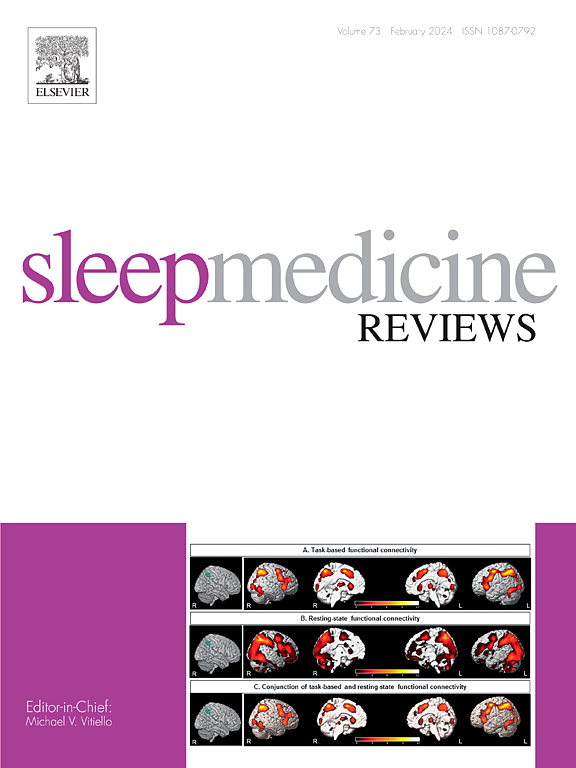失眠障碍中睡眠状态误解的神经生物学机制:理论综述
IF 9.7
1区 医学
Q1 CLINICAL NEUROLOGY
引用次数: 0
摘要
睡眠状态误解是失眠病理生理模型的核心,这表明它是由神经生物学机制的功能障碍引起的,导致睡眠被误解为清醒。目前的综述旨在综合有关睡眠状态误解的神经生物学机制以及现有文献支持该理论的程度的最佳文献。总的来说,研究结果表明,认知和神经生理上的过度觉醒和功能失调的感觉门控机制不能充分抑制觉醒,可能在很大程度上解释了悖论性失眠患者中观察到的睡眠状态误解现象。然而,到目前为止,大多数研究都依赖于比较自我报告的睡眠时间和多导睡眠图得出的睡眠时间,这限制了我们区分知觉影响和回顾性报告偏差的能力。因此,需要更多的研究使用睡眠-觉醒感知的同时评估来直接检验主观-客观差异是由睡眠状态感知的改变引起的这一假设。我们在这里报告了一个研究议程,以促进该领域研究的进一步发展,并提出了几个仍有待探索的关键实证问题。本文章由计算机程序翻译,如有差异,请以英文原文为准。
Neurobiological mechanisms of sleep state misperception in insomnia disorder: A theoretical review
Sleep state misperception is core to pathophysiological models of insomnia, suggesting that it arises from a dysfunction in neurobiological mechanisms which result in sleep being misperceived as wake. The current review aims to synthesise the best available literature on the neurobiological mechanisms of sleep state misperception and the extent to which the existing literature supports this theory. Overall, findings suggest that cognitive and neurophysiological hyperarousal and dysfunctional sensory-gating mechanisms that insufficiently inhibit arousal may largely account for the phenomenon of sleep state misperception observed among patients with paradoxical insomnia. Most studies to date, however, have relied on comparing self-reports of sleep duration with polysomnography-derived sleep duration, limiting our ability to differentiate the effects of perception from retrospective-reporting bias. Therefore, more studies which use contemporaneous assessments of sleep-wake perception are required to directly test the hypothesis that subjective-objective discrepancies arise from altered perception of sleep states. We report here a research agenda to promote the further development of research in the field and propose several key empirical questions which remain to be explored.
求助全文
通过发布文献求助,成功后即可免费获取论文全文。
去求助
来源期刊

Sleep Medicine Reviews
医学-临床神经学
CiteScore
20.10
自引率
3.80%
发文量
107
期刊介绍:
Sleep Medicine Reviews offers global coverage of sleep disorders, exploring their origins, diagnosis, treatment, and implications for related conditions at both individual and public health levels.
Articles comprehensively review clinical information from peer-reviewed journals across various disciplines in sleep medicine, encompassing pulmonology, psychiatry, psychology, physiology, otolaryngology, pediatrics, geriatrics, cardiology, dentistry, nursing, neurology, and general medicine.
The journal features narrative reviews, systematic reviews, and editorials addressing areas of controversy, debate, and future research within the field.
 求助内容:
求助内容: 应助结果提醒方式:
应助结果提醒方式:


